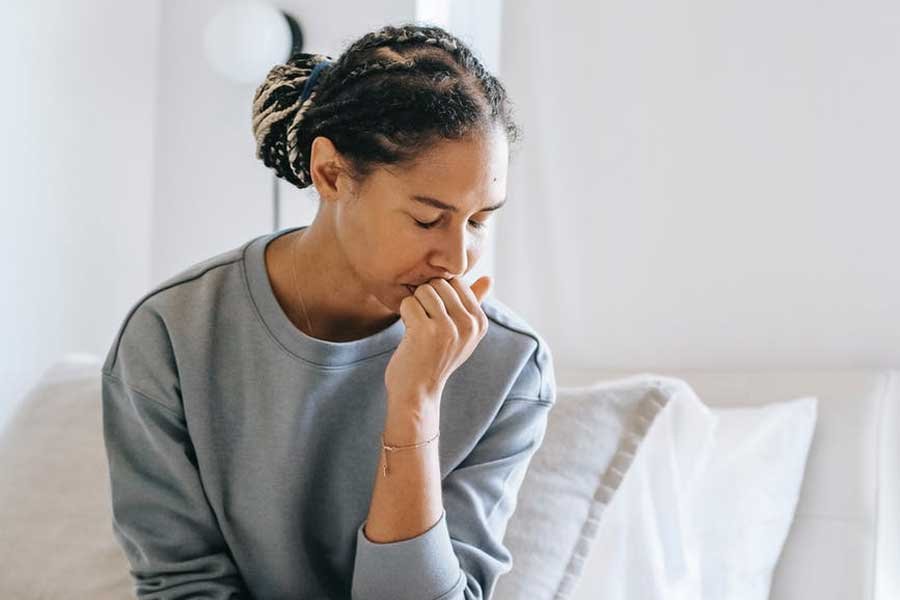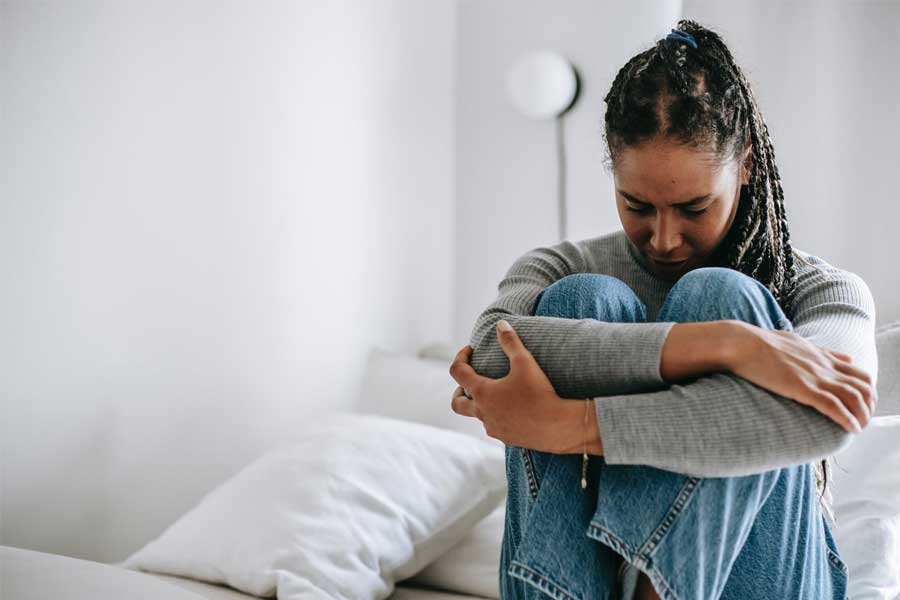Everyone experiences anxiety from time to time. However, sometimes it’s unmanageable. Almost 20 percent of the American adult population has an anxiety disorder.
Because anxiety disorders often have physical symptoms, people confuse them with other medical conditions. Anxiety can make other health problems worse. Unmanaged physical conditions can also exacerbate anxiety. Fortunately, there is a wide variety of treatment options for anxiety.

We help you find your psychologist
What is anxiety?
In short, anxiety is a feeling of unease. It happens when your central nervous system is activated into an alert state. This happens when you are exposed to a real or imagined threat. In an effort to battle that threat, your heart rate speeds up, your blood flows to your extremities and your body sends out signals that encourage you to protect yourself by fighting, fleeing or freezing.
When you’re feeling this way, you can’t think about your basic needs. You’re in survival mode, which means that you prioritize activities that will deliver immediate safety. Your creativity and ability to think clearly are stifled. You may feel distressed, irritable, unfocused and scared.
When does healthy anxiety become a problem?
Anxiety is a normal response to your body’s stress mechanisms. It keeps you safe by promoting survival functions when you are threatened. Moderate amounts of stress also make you feel energized and motivated. Too little stress can make you bored and depressed.
After the threat has subsided, your body is supposed to balance itself out. Your levels of stress hormones diminish, and normal bodily functions resume.
If you have an anxiety disorder, your central nervous system doesn’t downregulate stress when the threat is over. Problematic thoughts, emotions, sensations and behaviors repeat themselves in a pattern that negatively affects your life.
Anxiety disorders are characterized by disproportionately extreme feelings of unease that last longer than six months and make it hard to function normally.

Generalized anxiety disorder
Generalized anxiety disorder, or GAD, is characterized by excessive worry about routine events. Everyone experiences unexpected unfortunate events periodically. But someone with GAD is consumed with apprehension that is unrelated to the actual state of things. People with GAD may suffer from other anxiety disorders or mental health conditions.
Some symptoms of GAD include:
• Continual tension and worry
• Exaggerated perspective of problems
• Increased restlessness or irritability
• Changes in sleep quality
• Body aches
Panic disorder
Anyone can have a panic attack at any time. But some people develop anxiety about having a panic attack. They may alter their behavior to avoid having a panic attack. Up to 3 percent of people who have panic attacks develop panic disorder.
Social anxiety
Social anxiety disorder causes significant stress and worry when people are around others. Avoidance of social situations may interfere with school, work, family life and other daily obligations.
Some symptoms of social anxiety disorder include:
• Fear of interacting with strangers
• Intense worry that you’re being judged or will embarrass yourself
• Scrutinizing your words and actions around others
• Avoiding situations that make you the center of attention
Obsessive-compulsive disorder
People with obsessive-compulsive disorder, or OCD, have habitual unwanted thoughts or sensations that lead them to take on repetitive behaviors. If they’re unable to carry out the behaviors, people with OCD become distressed.
To be diagnosed with this disorder, an individual’s obsessions and compulsions happen for a more than one hour each day. They get in the way of normal social functioning and cause significant anxiety.
Post-traumatic stress disorder
Post-traumatic stress disorder occurs after a traumatic experience. The implied danger from that event can trigger your fight-or-flight mode. When the event is over, some people process it and recover.
People with PTSD can’t escape their heightened state. They often experience anxiety that’s related to the event. Eventually, people with PTSD may suffer from cognitive difficulties and negative changes in attitude. Symptoms may come and go.
What causes anxiety?
Anxiety can have several causes, including the following:
• Genetics
• Mental health conditions
• Physical illness
• Medications and drugs
• Chemical imbalances
Life events can also cause anxiety. Stress can come from anywhere. A minor stressor for one person can be a major stressor for another.
Some people develop anxiety after losing a loved one or going through a serious illness. Others have trouble relieving the stress from a job, relationship or global occurrence.

We help you find your psychologist

Treatments for anxiety
If you know what is causing your anxiety, you can treat it appropriately. Understanding your triggers and learning how your nervous system reacts in response to pressure can give you clues for treating anxiety.
Online therapy for anxiety
Anxiety is a tricky condition. If your anxiety is caused by social interactions or experiences with the medical field, you may be apprehensive about getting therapy. But working with a therapist helps you sort out your feelings, learn coping skills and manage your condition better.
For many people with anxiety, online therapy is a promising option. You can attend sessions from a comfortable location. You don’t have to share any personal information with the therapist. You can even choose to exchange text messages with your therapist if the face-to-face format is worrisome.
Plus, many online therapy platforms give you the ability to get in touch with your therapist around the clock. You would need to contact a local doctor if you were in crisis or experiencing an emergency. But being able to reach an online therapist regularly provides you with regular insight and support, which can help you avoid getting into crisis mode.

We help you find your psychologist
Cognitive behavioral therapy for anxiety
Many internet-based and in-person therapists offer cognitive behavioral therapy to help clients manage anxiety. Cognitive behavioral therapy, or CBT, is a skills-focused treatment that helps people change their thought and behavior patterns. It’s meant to be used as a short-term method for breaking unhealthy patterns and establishing positive ones.
CBT methods have been found to be effective for a wide variety of mental health issues, including anxiety. Some of the mechanisms used in CBT involve:
• Identifying negative thoughts
• Challenging negative thoughts and beliefs
• Replacing negative thoughts with positive ones
Exposure therapy
Exposure therapy is a type of CBT that helps you process your fears and rewire your nervous system to regulate itself better. Strong anxiety doesn’t feel good. It’s natural to ignore negative sensations and emotions and block the patterns of thinking that instigate them.
However, avoiding your fears usually makes them stronger. The level of anxiety that you feel isn’t always directly related to the intensity of the threat. When you ruminate on your worries, they become more powerful. Encountering the threat with adequate preparation and coping skills can help you process it so that anxiety about it no longer controls your life.
You shouldn’t undergo exposure therapy without guidance. You’ll need to be ready to react to the situation in a different way than you normally would. As you increase your exposure to the threat and manage your anxious response, you’ll become more confident that you can handle similar situations in the future.
Online anxiety support groups
Struggling with anxiety can impact everything in your life, making you feel alone. Sometimes, it helps to know that others are going through the same issues.
Hearing success stories from people who feel like you can give you hope. Learning that coping strategies are working for others can motivate you to stick with them yourself.
Making online therapy work for you
Online therapy is designed for convenience and customization. Finding the right in-person therapist could take several days or weeks. With online therapy, you’re often paired with a professional so that you can begin right away.
To make it work for you, commit to trying it out. You don’t have to continue it if you’re not happy with the service for any reason. Entering into therapy with an open mind and honest communication can help you get on the road to ease and relaxation.
Some people prefer to schedule therapy sessions ahead of time. Others communicate with their therapist throughout the week as issues come up. With online therapy, you’re free to participate as much or as little as you’d like.
Tell your therapist what you want to work on. If you need concrete homework and instructions, be vocal about it. Your counselor will give you suggestions and advice, but you can ask directly for what you need.
Getting started with Findyourtherapy
Findyourtherapy is an online therapy resource that’s ideal for people with anxiety. You don’t have to have a diagnosed disorder to learn more about managing anxiety. Many people work with a mental health professional to maintain a balanced, fulfilled life.
To get started with Findyourtherapy, head to the website. Scroll down to learn more about the importance of mental health and read articles about different types of online therapy.
You can subscribe to Findyourtherapy to get the most recent articles and advice delivered via email. This is an excellent way to stay informed about mental health issues that resonate with you.
What is holding you back from getting help for your anxiety? If you have hesitated to find a therapist, it’s time to try something new. Online therapy provides a convenient approach to client-centered care. Through Findyourtherapy, you learn more about managing health disorders and online therapy.

We help you find your psychologist


